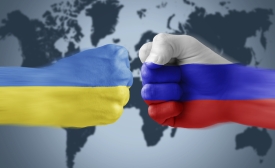russia

Prof. Erik Nisbet from the Ohio State University discussed how the messaging contest between Russian and Western media over the conflict in Crimea influenced Russian audiences.
Health care diplomacy trumps political tension between the United States and Russia for a delegation of doctors and nurses visiting La Crosse to glean ideas to improve care back home. The two doctors and three nurses are rubbing elbows with their counterparts and others at Gundersen Health System this week as part of World Services of La Crosse’s Bridging Cancer Care project.
The EU’s sanctions on Russia are not having their desired effect. At least in the short term, they even appear to be reinforcing Russia’s position. The EU policy approach to the Ukraine situation needs to factor in the mainstream Russian media narrative. Doing so suggests that the EU should be using more soft power.
Estonia has summoned the Russian ambassador over what the Tallinn government says is the cross-border abduction of an Estonian intelligence officer operating on the Estonian side of the Russian border. The Estonian Foreign Ministry says the security officer was seized Friday by unknown gunmen and taken into Russian territory. Moscow says the man was operating on its side of the border and is suspected of being a spy.
Diplomacy is traditionally carried out behind closed doors, in hushed rooms, with perhaps a bowl of Ferrero Rocher to hand to put ambassadors at ease. Diplomacy 2.0, though, is carried out in public and, like everything else on social media, with a fair amount of sarcasm.

Soft power was all over the news this week in public diplomacy.
This was the most significant Western arms sale to Russia and its postponement - the exact terms of the suspension of the deal are not clear - marks a very visible rebuff to Moscow on the eve of Nato's Wales Summit. The Mistral assault ships can carry up to 16 heavy helicopters, land troops and armoured vehicles. Their delivery would have resulted in a marked improvement in Russia's amphibious capability.
When political leaders and diplomats from different countries struggle to communicate in a cultured way, it is the artists, poets and museum curators who may bring sanity back to international relations. There is no shortage of cultural bodies, grass roots and state sponsored, that are working to keep up the dialogue between Russia and Britain.







